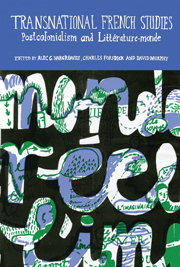Book contents
- Frontmatter
- Contents
- Acknowledgements
- Introduction: What Does Littérature-monde Mean for French, Francophone and Postcolonial Studies?
- From World Literature to Littérature-monde: Genre, History and the Globalization of Literature
- Postcolonialism, Politics and the ‘Becoming-Transnational’ of French Studies
- ‘On the Abolition of the French Department’? Exploring the Disciplinary Contexts of Littérature-monde
- Francophonie: Trash or Recycle?
- (Not) Razing the Walls: Glissant, Trouillot and the Post-Politics of World ‘Literature’
- The ‘Marie NDiaye Affair’ or the Coming of a Postcolonial Evoluée
- (R)Evolutions
- Littérature-monde and Old/New Humanism
- Mapping Littérature-monde
- Afterword: The ‘World’ in World Literature
- Appendix: Toward a ‘World-Literature’ in French
- Notes on Contributors
(R)Evolutions
from Postcolonialism, Politics and the ‘Becoming-Transnational’ of French Studies
- Frontmatter
- Contents
- Acknowledgements
- Introduction: What Does Littérature-monde Mean for French, Francophone and Postcolonial Studies?
- From World Literature to Littérature-monde: Genre, History and the Globalization of Literature
- Postcolonialism, Politics and the ‘Becoming-Transnational’ of French Studies
- ‘On the Abolition of the French Department’? Exploring the Disciplinary Contexts of Littérature-monde
- Francophonie: Trash or Recycle?
- (Not) Razing the Walls: Glissant, Trouillot and the Post-Politics of World ‘Literature’
- The ‘Marie NDiaye Affair’ or the Coming of a Postcolonial Evoluée
- (R)Evolutions
- Littérature-monde and Old/New Humanism
- Mapping Littérature-monde
- Afterword: The ‘World’ in World Literature
- Appendix: Toward a ‘World-Literature’ in French
- Notes on Contributors
Summary
There is no need for a littérature-monde. The hot topic among the literary and publishing circles of Saint-Germain-des-Prés does, nevertheless, provide an opportunity for specialists in Francophone writing and cultures to exchange views on the evolution of our fields of research in a global context, and to do so from an academic standpoint.
Littérature-monde? No revolution here, at least not when seen from the North-American side of the Atlantic. This is a literary and publishing phenomenon which chiefly concerns Paris. It is not the group of young writers in Port-au-Prince associated with the publication La Ruche who brought down a government in 1946. Neither is it the ‘total revolution’ proposed by the Refus Global [total refusal] manifesto in 1948 which was intended to cut off all ties with social conventions, including the church, in Quebec. And it is not the young authors and creators of the journal Souffles in Rabat whose foray into international solidarity led to long prison sentences from 1972 onwards. In those manifestos where politics is involved, and where artistic movements extend to the plastic arts, singers, film-makers or simple ‘philosophers’, the debates are weightier, more urgent.
Much ado about nothing or, to quote Louis-Ferdinand Céline, these debates about Parisian publishing serve only to: ‘troufignoliser l'adjectif… goncourtiser… merde! enculagailler la moumouche, frénétiser l'Insignifiance, babiller ténu dans la pompe, plastroniser, cocoriquer dans les micros…’ (1937: 11).
- Type
- Chapter
- Information
- Transnational French StudiesPostcolonialism and Littérature-monde, pp. 164 - 177Publisher: Liverpool University PressPrint publication year: 2010
- 1
- Cited by

